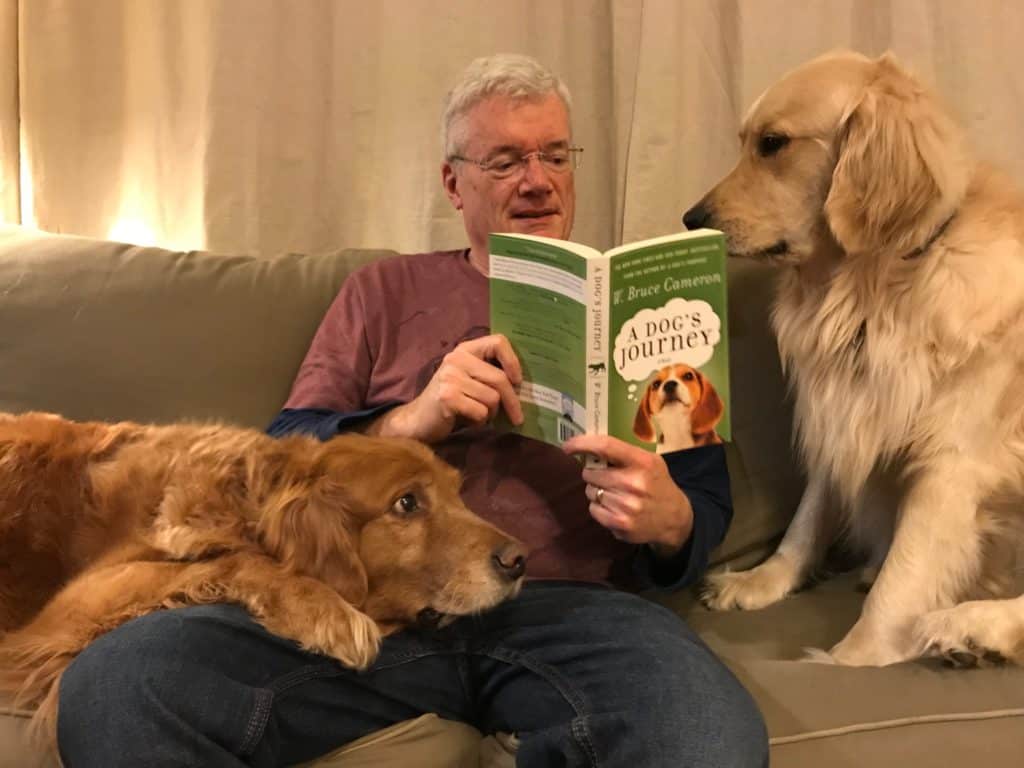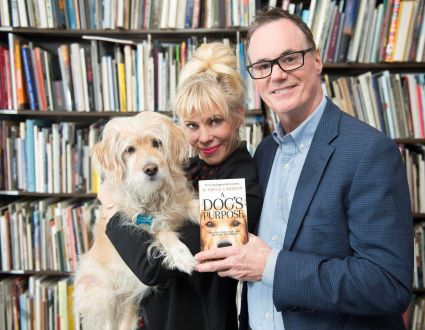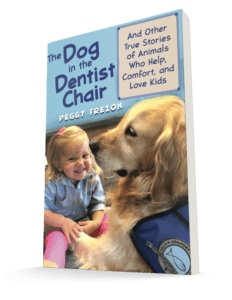It’s no secret that my husband and I are huge fans of W. Bruce Cameron. Mike even shares the books with Ernest and Pete.

So we were delighted to discover that Mike’s friend, Home Theater Forum reviewer Neil Middlemiss, scored an awesome exclusive interview with W. Bruce Cameron, our favorite author. AND, Neil kindly agreed to let us share his interview on The Writer’s Dog Blog. This piece first appeared on The Home Theater Forum (an internet site where film lovers gather to discuss all things DVD, home theater, and beyond) on August 21, 2019. Neil even was kind enough to frame one of his questions using yours truly as an example. Wow–me and W. Bruce Cameron in the same paragraph!
Please welcome Neil Middlemiss.
Author, screenwriter and producer W. Bruce Cameron is a charming man and the most successful author of books about dogs with 15 bestsellers translated into more than 50 languages around the globe. He began his career writing a family newspaper humor column, eventually becoming an internationally syndicated columnist. His column, 8 Simple Rules for Dating My Teenage Daughter became a New York Times Bestselling book and a People’s Choice Award Winning series on ABC. He is perhaps best known, however, as the Benchley Award Winning, #1 USA TODAY and #1 New York Times Bestselling author of the A Dog’s Purpose series of books. He’s also, along with his wife Cathryn Michon, served as screenwriter for the Universal’s A Dog’s Purpose and A Dog’s Journey.
Home Theater Forum spoke with the acclaimed author about the most recent adaptation of his novels, A Dog’s Journey, which hit theaters this summer and is now available to rent and own on Blu-Ray, DVD and Digital.
HTF: Good morning, Bruce, how are you today?
W. Bruce Cameron: I am excellent. How are you?
HTF: I’m doing terrific, but I’m a little mad at you! I watched the film for the first time last night and I was not expecting to weep so much. How dare you [laughter].
W. Bruce Cameron: [Laughter] A lot of guys are really mad at me.
HTF: I’m sure you’ve had these conversations with dozens, if not hundreds of people who connect to those heartbreaking moments when you have to say goodbye to a beloved pet. So of course, quite early in the film, where Dennis Quaid’s Ethan character is saying goodbye Bailey, and asking that when he comes back he look after his granddaughter, CJ, it takes me back to the couple of times that I’ve had to say goodbye to my four-legged family members. You’re often in a veterinary office and saying your goodbyes knowing it’s the last time. So, do you cry when you write those scenes in your books? I mean, does it take you back to the moment you share on your site’s bio about as a boy letting go of your dog the first time? Does it take you back and do you find yourself crying, or have you written it enough where you’re able to get through it without tears?
“So, this is a book about a dog that really died. Bailey keeps coming back to life, so in that regard, I can sort of comfort myself, but on the other hand, I climb into the hearts of my human characters and I see how they’re feeling when they say goodbye.”
W. Bruce Cameron: Oh, I’ve cried. There, I admitted it. Yeah, I do cry. So, this is a book about a dog that really died. Bailey keeps coming back to life, so in that regard, I can sort of comfort myself, but on the other hand, I climb into the hearts of my human characters and I see how they’re feeling when they say goodbye. And even Dennis Quaid, who really does such an excellent job as Ethan because Ethan really believes that this dog can and most likely will come back–for him it’s kind of his religion-and yet, he’s still saying goodbye to this dog that he loves so much and especially watching the actor because he’s so talented, going through that moment, it makes me cry.
HTF: It’s not an end, but it is an ending, and you’re right, you connect with how Dennis Quaid is feeling in that moment. It’s a delightful moment in how it connects us, it binds us dog lovers together, but it’s so painful and tear-inducing, so I curse you for that [chuckles].
Let me ask what it means to you to have your beloved books adapted into what have become beloved movies? I mean, did you imagine the potential for cinematic adaptation when you were writing the first of these stories?
“now, to sit in the audience and watch as they react to what they see on the screen, instead of hearing about it, I’m seeing it and that is a profound experience that really makes me feel I’ve accomplished something important.”
W. Bruce Cameron: I probably have a layered answer to that. Certainly, as a writer trying to make a success of my career, it is important to always try to write something that can be adapted. So, I do my best as I’m fastening my novels to keep at least a little bit of an eye toward what it would look like. But beyond that, people will tell me what the book has meant to them and I really appreciate it when someone says A Dog’s Journey is their favorite book. That means a lot, but honestly, now, to sit in the audience and watch as they react to what they see on the screen, instead of hearing about it, I’m seeing it and that is a profound experience that really makes me feel I’ve accomplished something important. And I have touched many people, not just entertain them, but perhaps influenced them to say, get a dog or to contribute to an animal rescue or to care about some of the issues that kind of crop up in my books.
HTF: The world can seem so bleak at the moment and there’s something rich and warm about, not just the story in A Dog’s Purpose, but in the aesthetic; in the way it was shot. There’s almost a fairytale quality to it, and I mean that absolutely as a compliment. It has enough reality to keep it grounded so we can connect to it, but there is this sort of idealized view of the world, a very idyllic farm, just beautiful colors and landscapes and it’s just a warm place to live, even if we have ups and downs as the humans go through their character drama, but there is this sort of fairytale quality to the world. Is that how you see the world or is that just how the world has been sort of interpreted for the big screen? When you’re writing them, is that how you see it?
W. Bruce Cameron: Oh, I believe that for me, I absolutely believe that love is the most powerful force in the universe and I do agree that one can become awfully fixated on bleak events and dismal news and despair and lose hope, or some can embrace the idea that there’s a constant out there which is love and that this love, if you want to look at your dog, it’s centered around how that dog is looking at and how your dog feels about you. And I really believe that I see the world that way because I have a dog in my life.
HTF: Oh, I love that answer. Now, teaching the world about the wonder and unending love and devotion of dogs, which any dog owner will tell you is just pure joy, is a huge core of your writing, but I also love how you find ways showcase the emerging or talents and gifts and skills that dogs have that some might not know about, such as the cancer sniffing element in A Dog’s Purpose. Is that important to you to expand, I guess, the conversation or the understanding of the intelligence and the power of our four-legged friends that way?
W. Bruce Cameron: It is very much a critical part of my focus to remind people that we have these magnificent creatures who don’t just lie on our couch and chew on our shoes, they can do things for us if we turn to them. And they really have evolved by our side as our first domesticated animal, as our partner in so many things, hunting and so many other tasks, the dogs are there. They’re leading the blind, they are sniffing cancer. So it’s very important to me that people understand we have this partnership that literally, as we were shaping them into dachshunds and schnauzers and Labradors because we needed certain attributes to be emphasized, we were breeding dogs, they were kind of breeding us because as we first began this partnership with them many, many years ago during the Paleolithic, those of us who could successfully master the relationship with a dog were much more likely to live. So, we evolved to love dogs because it was a survival strategy. If you believe in Darwinism, you believe that dogs and people belong together.
HTF: Now, in writing, more recently, do you hear Josh Gad’s voice in your head or is there a different voice that you’ve had in your head for your four-legged protagonist Bailey? Which voice wins out when you think of that voice now?
“I think Josh [Gad] does a phenomenal job capturing the joy and the sort of blissful ignorance and happiness of being a dog.”
W. Bruce Cameron: No one has ever asked me that question and my honest answer is I don’t really hold Josh Gad’s interpretation of the character in my mind when I am writing. I have a different voice. I think Josh does a phenomenal job capturing the joy and the sort of blissful ignorance and happiness of being a dog. I have other things going on in my mind when I’m writing the dog’s voice and if I tried to incorporate Josh to try to bring him in as the ghost of books past and try to make him work for me, I don’t think it would work for me, but when we’re doing the screenplays, we know who’s going to be voicing Bailey and so we keep that firmly in mind as we’re going after that particular character on the page.
HTF: Oh, that’s interesting. And when you were writing the stories, how did you choose the breeds that Bailey would ultimately be reincarnated into? Was that instructed by what you would want the dog to get into, that portion of the story, or did you select the breed based on some other criteria and that helped you find the fun and the challenges and the quagmires that the dog would get into? It’s a chicken-and-egg kind of question!
W. Bruce Cameron: Yeah, that’s an excellent question. There was deliberate choice, especially in the first book, A Dog’s Purpose, because I needed a search and rescue dog and then I needed a black lab who would blend into the night, these are the books, not the movies. But, my appreciation for animal rescue has been evolving and if you’ll notice, as we go forward, I become much less breed-specific and much more about mixed breeds and rescue dogs than I was when I first set out to write. And it was because even when I got my first Labrador as an adult, I bought the dog the way my dad did. I went through a breeder and I thought that’s the only way you could get a good dog. The way I adopted Tucker was he was dropped off at an animal shelter as a puppy and we snapped him up. And nobody knows what Tucker’s DNA– no one can guess. I believe that what they did was they took a little bit of every breed possible, put it in a blender, and mixed up my dog because he barks like a beagle and he’s got fur like a poodle on his back, but then he’s got legs like a terrier and he’s a little guy. He’s got a face like a golden. I don’t know. I don’t know what breed he is. So, there has been a deliberate choice as I’ve evolved toward making the dogs more and more mixed breed and more and more rescue and less and less about being a breed-specific animal.
HTF: Oh, I like that. The dogs that I’ve had, all of them except one have been rescue dogs. The first one we picked up a Chihuahua from off a country road, a breeder off a country road, some random old woman selling Chihuahuas, but outside of that, they’ve all been rescues and they’re just delightful. You never hit a wrong note when you rescue a dog, absolutely. I’m glad you’re weaving that into the stories.
W. Bruce Cameron: Absolutely!
HTF: Of the authors I’ve spoken to, it’s always interesting when you find out what a very talented author finds themselves reading. One of my good friends, his wife is an author and writes in the dog or animal space. Her name is Peggy Frezon. I don’t know if you’ve heard of her, but she’s written charming books like Dieting with My Dog and Faithfully Yours: The Amazing Bond Between Us and the Animals We Love. And so while hers are not fictional narrative, they’re real-life stories, I wonder if you find yourself reading in the same sort of genre, the dog or animal books, or do you go completely wild and only read fantasy or the like to give yourself a break from what you write day in and day out? What do you find yourself reading?
“I’ve been reading some Nicholas Sparks recently and I find myself forgetting that I’m supposed to be enjoying the reading, instead, I’m studying how he has structured the story.”
W. Bruce Cameron: I absolutely jump genres. I read Andrew Gross. I read Nelson DeMille. I read T. Jefferson Parker. So, I am reading thrillers with strong action-driven plots. And I think the reason I do that is I wouldn’t want to read a book similar to the kind I write. The character-driven dramas, I love reading them, but I feel almost that I need to study them as much as read them. I’ve been reading some Nicholas Sparks recently and I find myself forgetting that I’m supposed to be enjoying the reading, instead, I’m studying how he has structured the story. And so, this is my craft, there’s nothing wrong with it except for when I read, I want to read like I always have. I want to read for pleasure. I want to be entertained. I don’t necessarily want to be in college again, but that’s kind of how I approach books that are similar to mine.
HTF: I also wanted to ask you about the cast of actors and the wonderful cast of dogs that bring your stories to life, not just A Dog’s Purpose but your previous films, as well. What does it mean to you to have the caliber of actors that we’ve seen in the films? And I’m a lifelong fan of Dennis Quaid, so any time he’s in something, I’m interested, but to have someone like Dennis Quaid bring Ethan to life over a couple films now and so on, what has it meant to you to have this superb cast help bring these stories to life?
“The most important part to me was to tell Dennis [Quaid] to his face how gratified I am with the way he not only brought the character of Ethan to life, but evolved Ethan.”
W. Bruce Cameron: The most important part to me was to tell Dennis to his face how gratified I am with the way he not only brought the character of Ethan to life, but evolved Ethan. In A Dog’s Journey we follow the rest of Ethan’s life and how Dennis managed to age him up and reflect the changing nature of Ethan’s character after he brings Hannah back into his life. That was so important to be able to tell him that because Ethan didn’t exist until I wrote the name on a piece of paper and started filling in the details. And to be able to tell Marg [Helgenberger] that her Hannah makes me cry every time I watch A Dog’s Journey, was so gratifying. And I told Josh many times that he’s just perfect as the voice of Bailey and I can’t imagine anybody else doing it. So, having wonderful actors fill out the people roles has been very gratifying. And it was also very gratifying to be able to tell them to their faces just how much I appreciated their work.
As far as the dogs go, a lot of that decision is made based on what the director needs and, also, what the animal trainer says. So, I really was just mostly interested when the dogs would show up on set is just to play with them. I certainly had a lot of fun with them once they got [to set]. And I still think I’m amazed that I didn’t adopt the corgi from A Dog’s Purpose or one of the beagles from A Dog’s Way Home because I fell in love with those dogs. I would be thinking about them when I would go back to my hotel, I would still be smiling over playing with them. So, I didn’t have any input really into the choices, but I certainly got to know them as dogs.
HTF: Oh, that’s wonderful. Well, I really appreciate you talking to us today. I really loved A Dog’s Purpose. I even love that I cried. I’m not really that mad at you [laughter].
W. Bruce Cameron: [laughter] Fantastic!
HTF: Congratulations on your success and the film’s success, it’s just wonderful to see.
W. Bruce Cameron: Well, thank you!
Thank you Neil Middlemiss for joining us here today. And thank you to the Home Theater Forum for allowing me to repost this interview.



Bruce Cameron is great.
Neil Middlemiss is great.
And, Ernest and Pete (as you can clearly see in the picture at the top of this blog post) are both also great as well as keenly interested in the written word.
Oh. And Peggy Frezon is really great. Really, dear. I mean it. 😀
So, for me, this is one of my favorite blog posts ever. Some of my most favorite things in my world all coming together into one convenient place.
Thank you for introducing me to Neil and this great interview for the Home Theater Forum. My blog readers are definitely getting a treat.
Is it wrong that my favourite part of this post is the picture of Mike and the dogs? 🙂
It is a sweet picture. And Neil’s interview is just as sweet!
What a great interview. Loved when Mr. Middlemiss asked Cameron about both his writing and his thoughts on the movie. Always curious about how writers feel when their work is adapted for tv or movies.
I thought his response about how he heard Bailey’s voice in his own mind was interesting. I know when I write, I imagine they way the characters look and sound. I wonder who would voice Pete and Ernie in my movie? lol
Fantastic interview.. Cameron has created such beloved characters which translated so well into movies. I own all of them, because I have to watch them again and again and again…
I love, “Bailey, Bailey, Bailey….
You’re going to love it when Bruce Cameron’s new book comes out! https://www.amazon.com/Dogs-Promise-Purpose/dp/125016351X/ref=sr_1_1?keywords=a+dog%27s+promise&qid=1568772164&sr=8-1
I love the idea that we evolved to love dogs as a survival strategy! But now I’m going to have to work at not judging people who dislike dogs as weak people.
There are people who dislike dogs? Gasp!
This is the best interview with W. Bruce Cameron I have read (and I’ve read a few). He is my favorite author. Thank you for sharing this. I want to sign up for your blog notices.
I’m glad you enjoyed the interview. I was thrilled to be able to share this on my blog. Thank you for signing up for my blog notices!
I can’t wait to see the movie so I was thrilled to read this interview. I totally cried at the preview…doesn’t help I recently lost a dog but the fact is the love for dogs is universal. Awesome post.
My condolences on the loss of your dog. It’s always difficult to watch a movie where the dog dies…but it’s okay to feel something meaningful and shed a few tears. We love our dogs!
Oh, Peggy, what lovely interview! Isn’t it amazing what happens when we do what we love? We’re meant to shed tears and feel deeply. Before I read the post, I glanced at the photos and felt so much emotion!
Much love
Julie
If you haven’t read Bruce Cameron’s books, you should give them a try. They are among my favorites. And the movie was excellent too. And yes, go with tissues handy .
Neil Middlemiss has posted up an interview he did with author W. Bruce Cameron the author of the books A Dog s Purpose and A Dog s Journey (the movie of which is released this week on home video). HERE S the link!